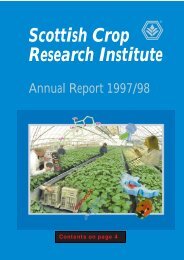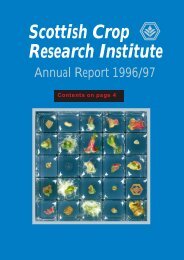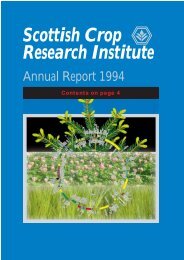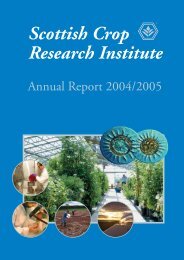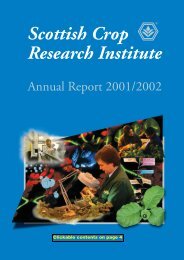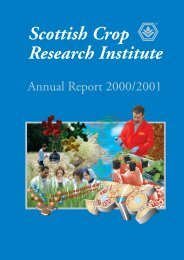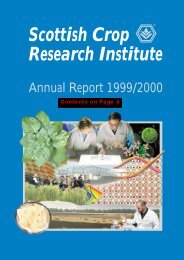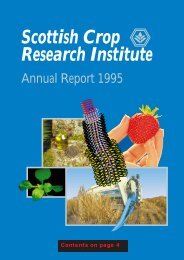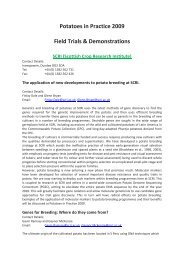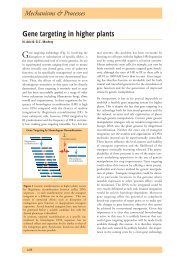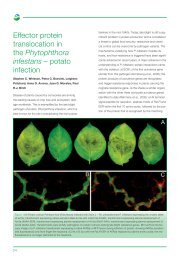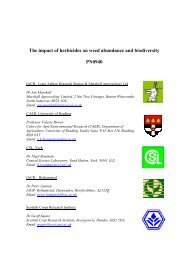PDF file: Annual Report 2002/2003 - Scottish Crop Research Institute
PDF file: Annual Report 2002/2003 - Scottish Crop Research Institute
PDF file: Annual Report 2002/2003 - Scottish Crop Research Institute
You also want an ePaper? Increase the reach of your titles
YUMPU automatically turns print PDFs into web optimized ePapers that Google loves.
GM herbicide-tolerant crops<br />
mitted to a journal, which has them scrutinised by<br />
experts in the subject, then rejects or accepts them.<br />
The Royal Society issued an explanation of the process<br />
of peer review 18 , but while it stated that rejection did<br />
not necessarily mean that a work was inherently<br />
flawed, it was clear that collectively we had to achieve<br />
the standard for acceptance.<br />
Peer review takes time. It was much faster for the<br />
media, working with activism, to fund some measurements<br />
and put out the results to greatest effect without<br />
any independent, critical review. This happened<br />
near the beginning of the experiments, when a<br />
national television news programme led on a story<br />
they had commissioned on pollen moving out from<br />
one of the FSE fields. The revelations were mostly<br />
existing knowledge, repackaged and sensationalised. If<br />
any of the scientists had so published without peer<br />
review, they should have been severely reprimanded,<br />
at least. We learned that even what appear to be<br />
authoritative news programmes take a line on issues!<br />
How were the results of October <strong>2003</strong> received? In<br />
the UK, the GM Science Review 19 and the Advisory<br />
Committee on Releases to the Environment<br />
(ACRE) 20 endorsed the study and the findings. The<br />
response from EU member states has generally been<br />
constructive. Several countries have taken an interest<br />
in the results of both the food web and geneflow studies.<br />
Some states, notably Denmark, had considered all<br />
available information and put in place their own resolution<br />
to possible conflict 21 . We have advised commissions<br />
in other countries, including Sweden and<br />
France. Opinion from the UK’s media on the conduct<br />
of the experiment and its findings was generally good:<br />
there was sufficient detail reported below the headlines<br />
to show that many journalists had taken the publication<br />
of results seriously. The headlines were mostly<br />
anti-GM, which distressed many biotechnologists.<br />
Some threw a few punches at the science of the FSE<br />
itself, but more reasoned reactions asked why the<br />
results had been so sensationally interpreted by the<br />
media 24 . The reasons for this are complex: biotechnology<br />
is still invisible and fearful to many people,<br />
and some of its proponents are dismissive when challenged.<br />
I support Joe Perry’s reaction 22 to the 114 scientists<br />
who signed a letter to the Prime Minister<br />
deploring the headlines and asking for a rational<br />
response by government 23 . Where had such numbers<br />
been (we ask) while the FSE scientists were being<br />
thrashed in public, defending the right to do the field<br />
work on GMHT technology? If as scientists, we are<br />
not prepared to get out and talk to people, to convince<br />
them, then we should complain less when the<br />
public object.<br />
More of substance to us was the criticism that the FSE<br />
had not measured everything or even not measured<br />
the right things 24 . It measured the things that were<br />
important for assessing GMHT cropping in GB at<br />
that time. Bulk offtake, as yield, was not measured.<br />
Rather, the mechanistic link between the crop and the<br />
food web was assessed through detailed measurements<br />
of the crop, its development, gross architecture, herbivores<br />
and their specialist consumers, all of which confirmed<br />
that the field management rather than the<br />
GM-ness of the crops affected the wider food web.<br />
The consortium nevertheless welcomed debate on<br />
what it had and had not measured: these are issues for<br />
the future.<br />
Unintended outcomes The tactic by certain activist<br />
and media interests of attacking one or other senior<br />
members of the FSE group was not an effective means<br />
of deconstructing the research programme.<br />
Admittedly, it sometimes put great stress on the person,<br />
sometimes causing their wellbeing to suffer. The<br />
more general result of the pressures on the FSE was a<br />
strengthening of trust and dependence between colleagues<br />
and institutes. This in itself was good for the<br />
conduct of the science, since the work, and particularly<br />
the analysis of the results, was done in secrecy.<br />
There was no opportunity during the FSE to expose<br />
our thinking and early data in the semi-public arena<br />
of the scientific workshop. Not even the civil servants<br />
in Defra, nor the heads of the three research organisations<br />
knew the result. The scientists themselves, supported<br />
by members of the Steering Committee,<br />
simply had to get it right, and we were aided in this<br />
because circumstances had already forced us to rely on<br />
each other. We also demonstrated that a virtual project<br />
was feasible, where the science of the project, and<br />
the colleagues doing it, operated through web contact<br />
almost independently of the organisations. Of course,<br />
we relied on the infrastructure and expertise of the<br />
parent institutes, but once given the money and task,<br />
members of the groups got on with it, completed it<br />
and shared much more with each other than they<br />
would normally have done in a standard multi-partner<br />
project. More widely, the FSE and other studies in<br />
Europe have generated a research community which<br />
has a broad, holistic, agenda that combines many disciplines<br />
in basic and applied science. This community<br />
offers the potential to nurture young scientists and<br />
87



